Cause Area
Secondary Sectors
Geographies Served
Programs
-
Education Outreach Program - Hamari Shala
This programme is the outcome of a need-based evaluation that was conducted in 2019 with Ashraya's parents, educators, kids, and dropout students to analyse the community's needs, evaluate Ashraya's progress, and develop a long-term plan. The most important lesson was that local government schools and reasonably priced private schools did not provide our community's youngsters with holistic development. In these schools, academics were the only focus, and our community's context was not taught. Following extensive study and discussion, Ashraya decided to use the National Institute of Open Schooling, India's Open Basic Education model. This gave us the freedom to design our curriculum, putting a strong emphasis on the social and cultural background of the community.
-
Ashraya’s Residential Program
Ashraya's Residential Programme arranges for boarding school education at neighbouring residential schools for a small number of orphaned and abandoned youngsters. Our Residential Programme staff provides extra care (counselling, medical attention, clothing and personal things, weekend visits, etc.) and a social support structure to enable each child to grow, develop, and experience love and care, even though the school takes care of their daily requirements.
Registration Details
-
PAN Card
AALCA9576D
-
Registration Number
U85100PN2013NPL146833
-
CSR Form 1
Not Available
-
80G
AALCA9576DF20214
-
12A
AALCA9576DE20214
-
FCRA
83930755
About
-
Headquarters
Pune, Maharashtra
-
Since
2004
Impact
AIC's programs are making an impact on the lives of children, women and communities they serve through educational support, holistic care, and community development initiatives.
Vision and Mission
AIC is dedicated to improving the lives and shaping the futures of vulnerable children in Pune, India by advancing educational opportunities, nurturing holistic development and building healthy, empowered communities.
Political & Religious Declarations
-
Political Affiliation
-
Religious Affiliation
Location
-
Headquarters
207, Navi Khidki, Near Shivaji Statue Yerwada Village, Yerawada
Directions, Pune, Maharashtra -
Offices in Cities
Other Details
-
Type
Non-profit
-
Sub Type
Society
Technology Adoption
-
SOC 2 Compliant
No
-
Financial Management
-
Beneficiary Management



